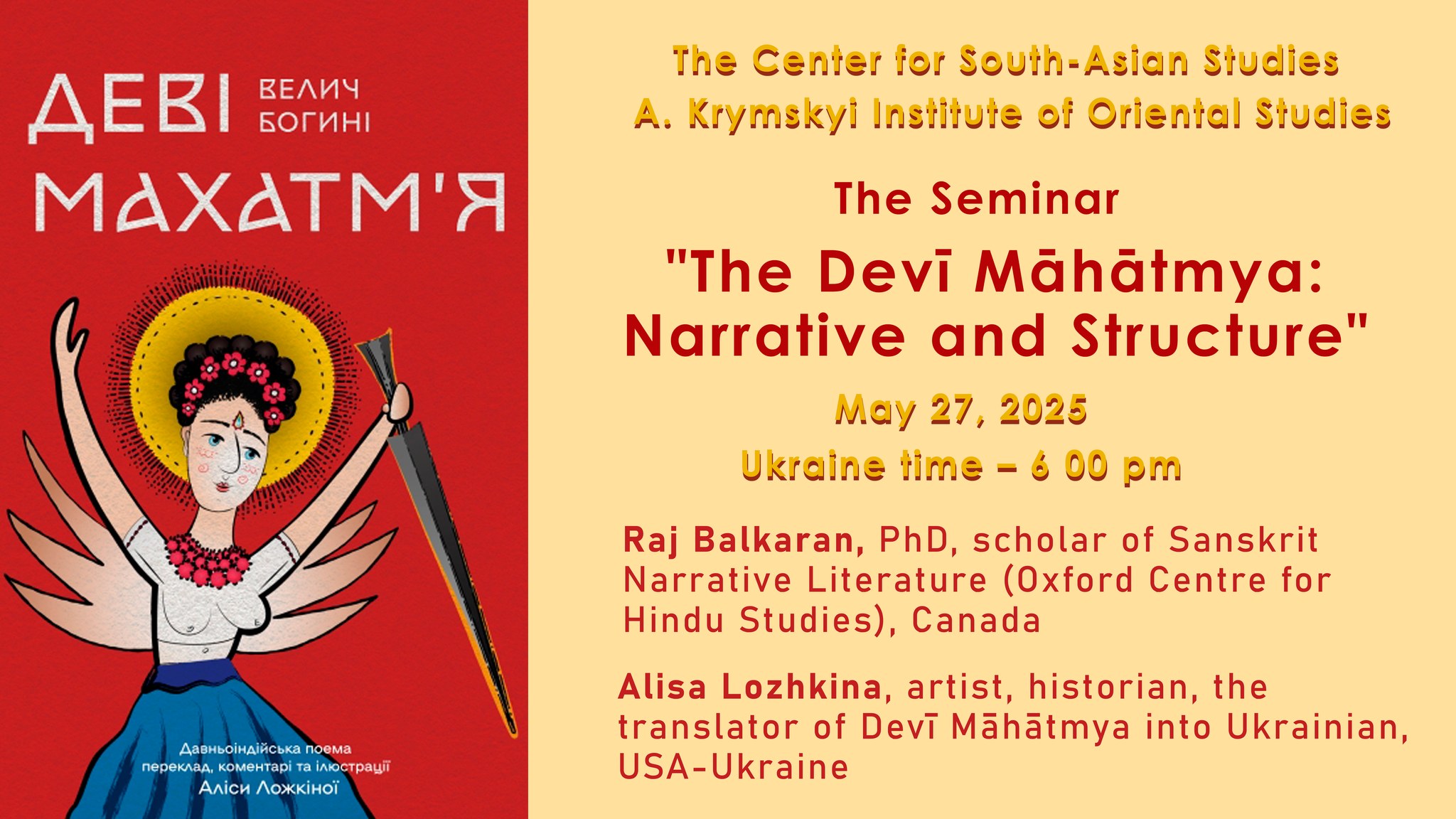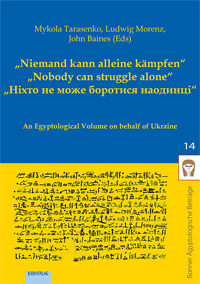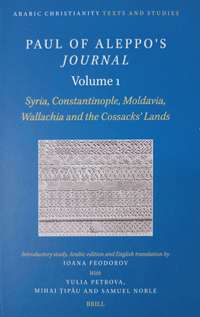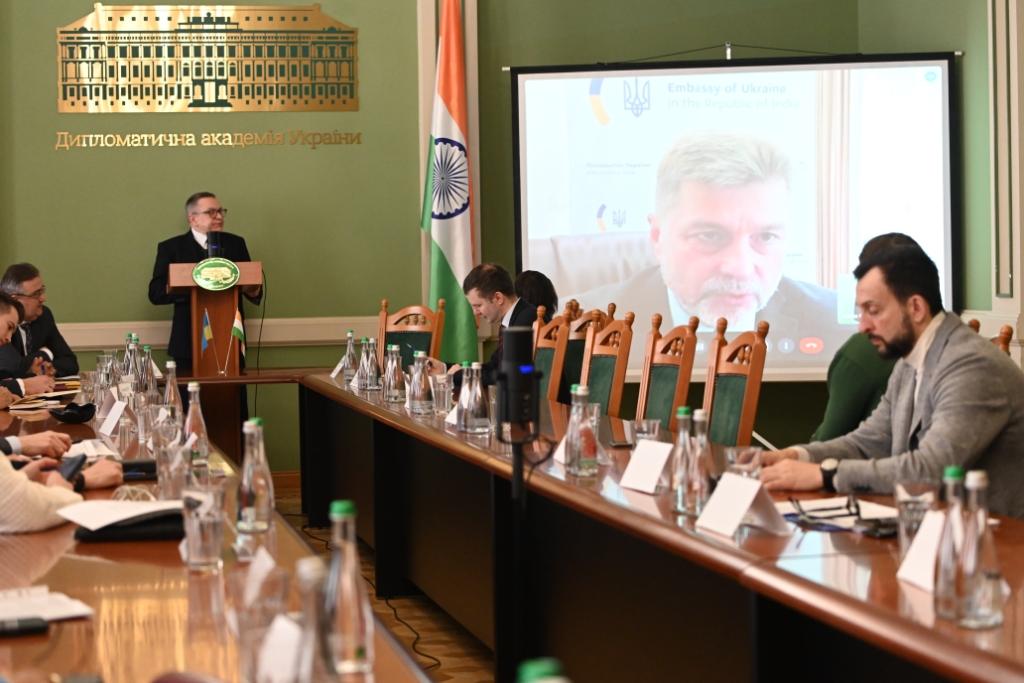Seminar “The Devī Māhātmya: Narrative and Structure”

“Niemand kann alleine kämpfen” “Nobody can struggle alone” “Ніхто не може боротися наодинці”: an Egyptological volume on behalf of Ukraine

The war of Russia against Ukraine is also a war against a culture, and for this reason it affects even a small subject like Egyptology. Twenty-four authors from eight countries have come together to contribute to a volume that intends to display our solidarity with Ukraine and to make plain that all of us seek actively to sustain cultures – in our case the understanding of that of the Nile with its more than three millennia of history – through engagement and shared conversations. By means of this joint undertaking we wish to counter brute force with the self-evident necessity of cultural exchange, both in our field of study and beyond.
M. Tarasenko, L. Morenz, J. Baines (ed.) “Niemand kann alleine kämpfen” “Nobody can struggle alone” “Ніхто не може боротися наодинці”: an Egyptological volume on behalf of Ukraine. Bonner Ägyptologische Beiträge. Bd. 14. Berlin. 2024
ISBN-10 386893443X
ISBN-13 978-3868934434
Roundtable “Mineral Deals as a New Diplomatic Tool: Ukraine, China, the EU, and the U.S.”
Dear colleagues,
We are glad to announce our upcoming roundtable “Mineral Deals as a New Diplomatic Tool: Ukraine, China, the EU, and the U.S.” on the Ukrainian Platform for Contemporary China.
Date: May 22
Time: 3:00 PM (Kyiv time) | 8:00 AM (Eastern Time)
Format: Online discussion (in English, registration required)
Speakers:
-
Ivan Us – Chief Consultant, Center for Foreign Policy, National Institute for Strategic Studies (Ukraine)
-
Xu Qinduo – Journalist at CGTN, Senior Fellow at the Pangoal Institution (China)
-
Jim Mullinax – Senior Foreign Service Officer, Diplomatic Fellow (United States)
-
Grzegorz Stec – Head of Brussels Office, Senior Analyst at MERICS (European Union)
Moderator: Kaiser Kuo, Co-founder of the Sinica Podcast
The international round table “China’s Strategy in Global Power Transitions: Challenges in a Turbulent World”
On February 19, 2025, the international round table “China’s Strategy in Global Power Transitions: Challenges in a Turbulent World” was held at the Ukrainian Platform for Contemporary China.
Organizers:
- A. Krymskyi Institute of Oriental Studies, NAS of Ukraine
- Ukrainian Association of Sinologists
- Sinica Podcast
- Publishing House “Helvetica”
Speakers:
- Klaus Larres, Distinguished Professor of History & International Affairs, University of North Carolina (UNC) at Chapel Hill, U.S.
- Qiang Liu, Secretary-General of the Global Forum on Energy Security, Chinese Academy of Social Sciences, P.R.C.
- Una Aleksandra Bērziņa-Čerenkova, Director of the China Studies Centre, Riga Stradins University, Latvia
- Dmytro Yefremov, Board Member, Ukrainian Association of Sinologists, Ukraine
The event was moderated by Kaiser Kuo, host and co-founder of the Sinica Podcast.
Kaiser Kuo noted that as the Russo-Ukrainian war enters its fourth year, the conflict has reshaped the global order, exposing vulnerabilities, shifting alliances, and forcing major powers to reassess their strategies. He highlighted that the Biden administration’s approach to China and its strong support for Ukraine are now history, with President Trump and Defense Secretary Pete Hegseth charting a new and uncertain course. Trump’s recent conversation with Putin signals potential realignments that will have far-reaching consequences for Ukraine, Europe, the Asia-Pacific, and global power dynamics.
Una Aleksandra Bērziņa-Čerenkova outlined two main risks for small states like Latvia due to Trump’s rapprochement with Russia. Increased security threat as the first risk. The Baltic states have relied on collective defense, but confidence in NATO’s security guarantees has been shaken, raising concerns about a potential Russian invasion. And a new “Iron Curtain” as the second. Trump’s undermining of the transatlantic alliance threatens European stability, as long-standing trust in U.S. commitments weakens.
Regarding China-Russia ties, she highlighted two red flags for the Baltics: both Russia and China view NATO expansion eastward as a provocation, and China’s former ambassador to France, Lu Shaye, questioned the sovereignty of post-Soviet states, raising concerns in the region.
Dmytro Yefremov argued that Russia and China are not looking like true allies. If the U.S. normalizes relations with Moscow, Washington will fully shift its focus to countering China. In this scenario, Russia could adopt a more neutral stance or even work to covertly contain China. He also mentioned the recent China-Ukraine diplomatic meeting at the Munich Security Conference, where President Zelenskyy suggested that for the first time, China appeared interested in pressuring Russia to end the war. Beijing may strategically seek to exploit the emerging opportunities presented by the deepening rift between the United States and Ukraine, positioning itself to capitalize on potential shifts in geopolitical dynamics. China might be using this opportunity to restore ties with the EU while ensuring it is not sidelined from future Ukraine-Russia negotiations.
Qiang Liu stated that China does not view the war in Ukraine as a core issue but rather a European conflict. He emphasized that China’s energy security is not at risk, despite buying Russian resources, as Beijing has diversified its energy imports. He also noted that for the first time in years, China’s oil consumption declined in 2024, largely due to the growth of alternative energy sources. Regarding diplomacy, he reaffirmed that China seeks to avoid conflicts and maintain friendly relations with all countries.
Klaus Larres pointed out that Trump’s approach to Ukraine sidelines key stakeholders, particularly European countries, despite their significant financial support for Kyiv. He argued that Europe must be included in peace negotiations, but so far, it has been largely ignored. The scholar also stated that a Sino-Russian split remains unlikely, despite U.S. efforts. China is unlikely to be brought into Ukraine negotiations but will likely play a role in post-war reconstruction.
Kaiser Kuo added that unlike during the Mao era, when border conflicts strained relations, there is no reason for a Sino-Russian split today. China benefits from watching the Western alliance weaken, and the idea of European strategic autonomy now seems more realistic.
Klaus Larres drew a historical parallel between Trump and Nixon, stating that Nixon’s diplomatic approach to China and the Soviet Union was carefully planned over years, while Trump’s actions appear reactionary and chaotic. China has an opportunity to rebuild relations with the EU, but this will likely focus on economic ties rather than a formal alliance.
Una highlighted Chinese narratives that portray European support for Ukraine as a challenge to peacebuilding. She noted that Ursula von der Leyen’s speech at this year’s Munich Conference took a softer stance on China, signaling a potential shift in EU-China relations.
About China’s role in post-war reconstruction:
Dmytro Yefremov stated that China’s entry into peacebuilding is too late, as Ukrainian public opinion remains largely negative toward Beijing, seeing it as Russia’s ally. However, Ukraine’s leadership views China as a potential investor in logistics and energy sectors. Key sectors likely to attract Chinese interest in Ukraine encompass not only logistics and transportation networks, but also agricultural infrastructure and potentially renewable energy, as China seeks to expand its influence in these strategically significant domains.
Qiang Liu emphasized that China could play a role in post-war reconstruction, but likely through European partnerships rather than direct investments in Ukraine. Qiang also noted that two of the six BRI corridors have been destroyed by the war, making it harder for Chinese goods to reach Europe via Russia. China will work on revitalizing the BRI projects in Ukraine.
Klaus Larres siad that Germany will likely prioritize its role in Ukraine’s reconstruction over China, as Berlin poses no political risks for Kyiv, unlike Beijing.
What Trump’s Tilt Toward Russia Means for China.
U.S. President Donald Trump’s negotiations with Russia are not only occurring at Ukraine’s expense but also carry broader implications for China. Historically, the opposite was true – Henry Kissinger’s strategic opening to China contributed to the Soviet Union’s eventual collapse. Now, the Trump administration is playing a calculated game with Russia, aiming to secure economic benefits such as cheaper raw materials while attempting to reshape Sino-Russian relations. The goal appears to be to pull Moscow away from Beijing and weaken their growing alignment.
However, a repeat of the Sino-Russian split seems unlikely in today’s geopolitical landscape, as both Russia and China remain skeptical of Trump’s erratic foreign policy and question the reliability of U.S. commitments.
Trump’s confrontational stance toward Ukraine’s President Volodymyr Zelenskyy has been a political shock for both Ukraine and Europe. Notably, the Trump administration, whether intentionally or not, has adopted China’s rhetoric over the past three years, referring to the Russia-Ukraine War merely as a “conflict” and promoting peace through negotiations with Russia. This approach was first put forward by China in February 2023 and has since been aggressively pushed through state-controlled media and diplomatic channels, including special envoy Li Hui. Now the Trump administration has repackaged this strategy in a more unilateral manner, with a key difference – amid Russia-U.S. talks, Ukraine and Europe are largely excluded from the decision-making process. The fate of Ukraine’s sovereignty and territorial integrity is being discussed behind closed doors, without its participation.
ХХVIII A. Krymskyi Memorial Conference on Oriental Studies
Dear colleagues!
We kindly invite academicians and lecturers, postgraduate and master’s degree students to participate in the ХХVIII A. Krymskyi Memorial Conference on Oriental Studies.
The conference will be held on June 26–27, 2025.
Discussion panels are planned to cover the following issues:
- History and Cultures of Eastern Countries;
- Religions and Philosophical Doctrines of the Peoples of the East;
- Asian and Middle Eastern Languages and Literatures;
- Nomads of the Great Steppe;
- History and Culture of the Crimea and the Black Sea Region;
- Oriental Artіfacts in Ukraine;
- Political, Economic, and Socio-Cultural Development of Eastern Countries in the Modern Age;
- History and Cultures of Indigenous Peoples, Ethno-Confessional Minorities of Eastern Descent Living in Ukraine;
- Jewish studies;
- History of Oriental Studies.
Presentation languages: Ukrainian, English. The presentation must be no longer than 15 minutes.
The conference will be held in a mixed format.
Participation is free of charge.
Applications are accepted until June 1, 2025:
To apply, please:
- fill in the registration form (in English) at: https://forms.gle/yt1NnxeLbQRgxXdD7
- send your presentation abstract to chytkrymskogo@gmail.com
For details please see the attachment.
The scientific journal Chinese Studies is accessible via the academic platform Taiwan Academic Classics
The ‘Chinese Studies’ is a scientific journal which is jointly issued by the A. Yu. Krymskyi Institute of Oriental Studies (National Academy of Sciences of Ukraine), the Ukrainian Association of Sinologists, and the Kyiv National Economic University named after Vadym Hetman, in cooperation with the Helvetica Publishing House. The journal publishes articles on current issues of Chinese history and contemporary development of China, the study of Chinese language and literature, the study of China’s contacts with other countries of Asia and Ukraine, historiographical reviews and critique, as well as information on scientific conferences. The journal publishes articles of domestic and foreign authors, as well as translations of historical, religious and literary sources of China. Since November 2020, the journal is included in the List of scientific professional publications of Ukraine category B in the field of philosophical, philological, political and economic sciences (specialties 033 “Philosophy”, 035 “Philology”, 051 “Economics”, 052 “Political Science”, 071 “Accounting and taxation”, 072 “Finance, Banking and Insurance”, 073 “Management”, 075 “Marketing”, 076 “Entrepreneurship, Trade and Exchange Activities”, 292 “International Economic Relations”). And since November 2024, the journal has been presented on the academic platform ‘Taiwan Academic Classics’.
This partnership creates new opportunities for the international dissemination of Sino studies, enhances the recognition of Ukrainian sinology within the global academic community, and establishes a solid foundation for advancing interdisciplinary research in Chinese studies.
From now on, scholarly articles published in the journal ‘Chinese Studies’ are accessible to readers and researchers worldwide on the ‘Taiwan Academic Classics’ platform.
XVIII International scientific conference “Chinese Civilization: Traditions and Modernity”
Dear colleagues!
We kindly invite you to take part in the XVIII International scientific conference “Chinese Civilization: Traditions and Modernity”, which will be held on November 14, 2024.
Paul of Aleppo’s Journal. Vol. 1. Syria, Constantinople, Moldavia, Wallachia and the Cossaks’ Lands

Paul of Aleppo’s Journal. Vol. 1. Syria, Constantinople, Moldavia, Wallachia and the Cossaks’ Lands / Introductory Study, Arabic Edition and English Translation by Ioana Feodorov with Yulia Petrova, Mihai Țipău and Samuel Noble. Leiden – Boston: Brill, 2024. 897 p.
https://brill.com/display/title/70121
Paul of Aleppo, an archdeacon of the Church of Antioch, journeyed with his father Patriarch Makarios III ibn al-Za’im to Constantinople, Moldavia, Wallachia and the Cossack’s lands in 1652-1654, before heading for Moscow. This book presents his travel notes, preceded by his record of the patriarchs of the Church of Antioch and the story of his father’s office as a bishop and election to the patriarchal seat. The author gives detailed information on the contemporary events in Ottoman Syria and provides rich and diverse information on the history, culture, and religious life of all the lands he travelled across.
ISSN 2468-2454
ISBN 978-90-04-69633-4 (hardback)
ISBN 978-90-04-69682-2 (e-book)
Proposition of Ukraine-India collaboration from the participants of Ukraine-Indian Forum, March 15, 2024

The Ukrainian-Indian Forum, held on March 15, 2024, brought together statesmen and officials, politicians, business representatives, leading scientists and experts from Ukraine and India on one platform. Institutional and personal contacts were established between some participants, which will further contribute to the intensification of ties between the peoples of Ukraine and India. Both sides continue to think about how to improve relations between the countries at both the state and civil society levels. These considerations have resulted in the recommendations below.
Technological collaboration
SINERGIA, Bengaluru
Scope
- Existing Technological Collaborations between India and Ukraine.
- Impetus to Existing and Exploring New Collaborations.
- Comprehensive Bilateral Agreements.
Existing Tech Collaborations Between India and Ukraine
India and Ukraine have a successful collaboration in technology and science, with diverse areas of cooperation, showcasing a strong partnership between the two nations.The Joint S&T Committee, established in May 1992, meets annually to discuss projects. There is a need to give impetus to the existing collaborations.
Space Sector: National Space Agency of Ukraine and ISRO have ongoing cooperation in the space sector. This includes joint satellite launches using Indian rockets and Ukrainian satellites, as well as scientific cooperation on space research projects.
Information Tech: India’s IT industry has partnered with Ukrainian IT firms on various projects includes joint software development and IT services outsourcing. Aptech Limited from Mumbai signing agreements with the International Institute of Personnel Management, Ukraine.
DefenceTech: India and Ukraine have a strong relationship in defense cooperation includes joint development and production of defense equipment, as well as collaboration on R&D projects.
Agricultural Tech: With both countries being major agricultural producers, India and Ukraine have partnered on agricultural technology initiatives. This includes collaboration on developing new crop varieties, improving irrigation techniques, and sharing knowledge on agricultural machinery.
Bio-Tech Sector: Both countries are cooperating in the biotechnology sector, with companies like Biocon and Genome engaging in joint efforts.
Opportunities for EnhancingTechnological Collaboration.
- Space Technology: India has a robust space program, while Ukraine has a rich heritage in:
- Space exploration initiatives,
- Aerospace engineering,
- Advanced Rocket Technology,
- Space Material science.
- Artificial Intelligence: India is a major IT hub, while Ukraine too has a large pool of skilled IT professionals.Both countries must actively develope AI applications. Collaboration can lead to advancements in areas like
- Tech Solutions & joint software development,
- Machine learning,
- Natural language processing.
- Telecommunications: India has a large and growing telecom sector, while Ukraine has expertise in:
- Satellite comn tech – integrating satl tech into India’s existing network,
- Next-generation telecom infrastructure and services,
- Cyber Security Solutions- India is a growing digital economy, but cybersecurity threats are a major concern. Ukraine has a strong pool of cybersecurity professionals and experience defending critical infrastructure from cyberattacks.
- Collaboration / co-development of advanced security solutions,
- Information sharing on emerging threats,
- Training programmes for Indian cybersecurity professionals.
- Defence Technology: Both nations have well-established defence sectors. Joint ventures can focus on:
- Co-development of weapon systems,
- ISR technology transfer,
- Military Aircraft engines/ spares,
- Submarine Engine technology.
- Renewable Energy: India is looking to diversify its energy mix, while Ukraine has expertise in:
- Solar and Wind power generation,
- Collaboration in RE technologies,
- Setting up manufacturing facilities,
- Supplying turbines for power plants – thermal, hydroelectric and nuclear plants.
- Biotechnology: India has a strong pharmaceutical industry, while Ukraine has expertise in genetic engineering. Collaboration can lead to advancements in vaccine development, drug development and pharma R&D.
- Nano Technology: Both countries have ongoing research programs in nanotechnology. Joint efforts can focus on developing nanomaterials for various applications, such as:
- Electronics,
- Medicine,
- Energy
- Agriculture Technology: India is a major agricultural producer, while Ukraine has expertise in precision agriculture techniques. Collaboration can address challenges:
- Crop yield improvement,
- Soil management,
- Sustainable farming practices,
- Irrigation Tech.
- Education and Training: Collaboration in education and training programs can help develop a
- Future workforce skilled in emerging technologies.
- Student exchange programs,
- Joint research projects,
- Faculty development initiatives.
Comprehensive Bilateral Agreements
- Prioritise specific opportunities for Tech collaborations.
- Working groups to jointly examine each proposal.
- Agreements to implement proposals in a time bound manner.
By leveraging the complementary strengths, India and Ukraine can become leaders in technological innovation on the global stage.
India – Ukraine Interparliamentary cooperation
Yulia Klymenko, Secretary of the Group for Interpar liamentary Relations with the Republic of India, Member of Parliament of Ukraine.
- Intensify parliamentary cooperation between Ukraine-India friendship groups. Including in 2024 a joint delegation of the Verkhovna Rada + the Cabinet of Ministers (Ministry of Economy, Agro, Infrastructure and Strategic Industries) + business + academic and public sectors to visit India.
- To hold a scientific conference on the results of the elections in India (Yulia Klymenko, Secretary of the Group for Interparliamentary Relations with the Republic of India, Member of Parliament of Ukraine ).
India – Ukraine bussiness cooperation
Yulia Klymenko, Secretary of the Group for Interparliamentary Relations with the Republic of India, Member of Parliament of Ukraine.
- Invite an Indian delegation in the fall of 2024 and hold a business forum at that time.
India – Ukraine cooperation in education
Yulia Klymenko, Secretary of the Group for Interparliamentary Relations with the Republic of India, Member of Parliament of Ukraine.
- Sign agreements/memorandums of cooperation between universities of Ukraine and India
India – Ukraine collaboration in media sphere
Ram Dange, Deputy Chairman of the Ukraine-India Society, founder of Indrayani Overseas and Gala Foods
India’s media sphere is lack of information about Russia-Ukraine war and Indian media is dominated by the Russian point of view. There are steps to change it.
- To create the information bulletin revealing the war events where the Indian journalists will take participation;
- To create a video with a strong message on war events in Ukraine (Bucha, Mariupol, Kharkiv, Odesa) where the Indian journalists will take participation;
- Such bulletin/video can be sponsored by Western countries;
- Bulletin will be shown in India on the main important TV channels as well as the journals there in India.
- To make an event like the recent Forum, but with big media coverage.
Ukraine – India Collaboration in Cinematography
Stanislav Martyniuk, civil activist
- Create a production base in Ukraine to translate films and TV series from and into Indian languages
- Establish an exchange of film and television products to which state agencies in both countries have rights
- Hold a Ukrainian-Indian forum for professionals in the field of film and television production
- Harmonize legislation in the field of film production, in particular, provide for subsidies (rebates) for filming for film crews from both countries, following the example of agreements between India and the United Kingdom, India and the United States
- Establish an exchange of students studying languages (translators) and those studying to become film producers (directors, cameramen, etc.)
- Hold a festival of Ukrainian cinema in India and a festival of Indian cinema in Ukraine
- Screen several Indian TV series in Ukraine, such as Mahabharat (2013) and Devon ke dev Mahadev (2013), to familiarize Ukrainian audiences with the cultural heritage and worldview of Indians. This will help Ukrainians better understand Indians.
- Show a selection of 50 Ukrainian films in India that will form a pro-Ukrainian image in the minds of Indian viewers as opposed to Russian propaganda in India
- Actively engage Indian actors and musicians as Goodwill Ambassadors
- Develop co-production of feature films and documentaries
Ukraine – India collaboration in publishing industry
Valentyna Vitkova PhD, Director, Publishing House “Asiatica”
As a publisher of popular scientific literature, we see the following key points for development:
- India has a rich cultural heritage, which can be presented through popular science publications about its history, architecture, religion, philosophy and traditions;
- India also has a long tradition in the fields of philosophy, medicine, mathematics and astronomy, which can be represented through popular science books;
- India is also one of the leaders in the development of modern technologies and scientific research. The publication of joint scientific research and monographs can strengthen the scientific communities of both countries and facilitate the exchange of knowledge and experience;
- participation in Indian Book Fairs and Exhibitions.It is necessary to take part in reputed Indian book fairs (New Delhi World Book Fair, Jaipur Literature Festival, etc.), which may provide us with an opportunity to introduce our books to the Indian audience and establish contacts with publishers and authors. In particular, in January 2025 Asiatica Publishing house is going to attend the Chennai Book Fair;
- organizing the exchange of authors and experts between Ukraine and India (common research projects, exchange of experience and organizing joint lectures and seminars) can contribute to the creation of new books and popular scientific works.
Here are a few directions that we see in the future within the framework of Ukrainian-Indian cooperation in the publishing field:
- book catalogue replenishment. The publishing catalogue always serves as an important tool for establishing effective cooperation in the publishing industry. It is necessary to enrich our catalogue with works by authors from India, offering Ukrainian readers even more literary works and other projects;
- partnerships with authors and publishers: to look actively for new authors and work with publishing houses to present new and unique works to our readers;
- market expansion: to study development prospects not only in the Ukrainian market, but also at the international level;
- expanding cooperation with educational institutions: to cooperate with educational and research institutions in Ukraine and abroad;
- to support research activities and publish scientific works,monographsand articles related to the study and research of various aspects of Indian culture, history, religion and other areas;
- to publish translated works in order to provide Ukrainian readers with a wide range of literature from India, including access to unique texts.
In addition, the following vectors are undoubtedly important for the development of Ukrainian-Indian relations in the publishing industry:
- the exchange of literature and books. The prospect here is to increase the exchange of books and literature between Ukraine and India;
- joint publishing projects: collaboration in creating common books and series is possible;
- opportunity to exchange experience and know-how in the field of publishing, marketing and book promotion;
- the establishment of common literary journals and publishing series to promote Ukrainian and Indian literature on the international market;
- the development of online presence: to develop websites and other online platforms in order to popularize books and establish a closer connection with audience;
Each of these perspectives has its own unique advantages.


